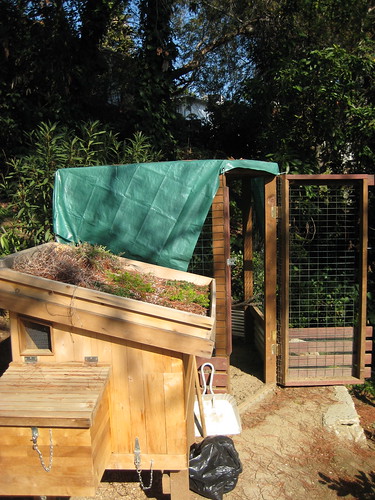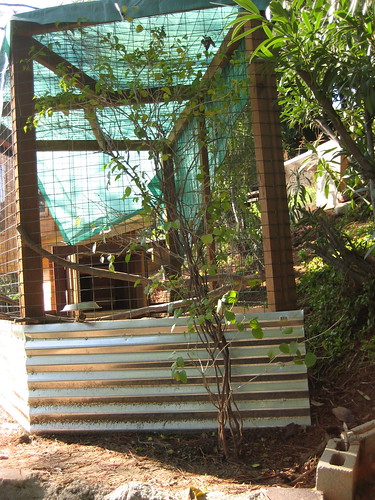We weren't able to clean out the coop last weekend because it was so rainy and muddy, and the girls haven't been getting nearly enough free-range time. This makes them kind of antsy. Plus, their feet and legs are really muddy and Peggy's beard is looking a bit scruffy.
When the first winter rain came in January, I ran out and got the girls a tarp to keep their run dry. It works fairly well, but if it rains hard, the dirt floor of the run definitely gets muddy.

We also drilled a hole in an old metal pie pan and put it above the hanging feeder, almost like an umbrella. Again, that works in a light rain, but a downpour still soaks their feed, turning it into a mushy cake. Luckily, Peggy and Tina don't seem to mind eating their food in mush cake form. I just have to clear it out pretty quickly so it doesn't mold.
I think after all these rains are over, we might look at ways to help with drainage around the coop, and we'll probably put gravel around the outside of the chicken enclosure, so it's not so muddy and slippery down there. A couple of weeks ago, I planted some more bushes below the coop, which should help absorb some of the run off.
Happily, there is at least one plus-side to the rain as far as the chickens are concerned: It should help the vine I put at the far end of the run grow bigger and bushier. Last Fall, I planted it as an attempt to provide shade and privacy while adding pleasant scent to the area. I chose a Vanilla Trumpet Vine, which is supposed to be well-suited to our climate and produces lots of fragrant, purple flowers. With all this rain, I'm hopeful that Sping will bring thick green foliage and lots of blossoms.

There's more rain in the forecast for this weekend and next week, which is great, as long as we have a long-enough break to get all the poop-soiled shavings out of the coop. I guess the hens will have to play indoors for a while. Maybe I should teach them tic-tac-toe.


We are so happy with the rain here too! The chickens seem to love the mud in our yard - and have quickly learned there are many more bugs to be found there...
Just wanted to add too, to check on your trumpet vine - it was my understanding that all parts are poisonous to pets and people...
tracy, thanks for the tip. I was pretty sure I only had non-toxic plants on my list when I went to the nursery to get a vine, but it's always best to be safe. So far, the only mention of kind find of trumpet vines being poisonous is here. It says that a regular Trumpet Vine (Campsis radicans) "may cause a skin rash or irritation," but it isn't designated as poisonous to pets and humans. I wasn't able to find anything on the Vanilla Trumpet Vine (Distictis laxiflora). Do you know where you may have read that?
Oh, I think I found what tracy was talking about! It has a similar common name, but seems to be a different plant, the Solandra maxima aka chalice vine, cup of gold vine or trumpet plant. It's a member if the nightshade family, and so quite toxic if ingested. Whew! Good to know though. Thanks for looking out for my chickens, tracy.
what a beautiful chicken coop you have!
Glad I was incorrect! It will be a lovely shade for your girls!
hi!
came across your blog whilst doing research for backyard chickens. i live in echo park and will hopefully be starting my own small flock very soon. i notice you seem to have a few different types of coop's. did you build them yourself or did you buy them and do you prefer any one over the other? i am probably going to build my own and am just starting to research designs. any insight would be appreciated. also, great blog- so happy to see fellow urban farmer's!
Hi Che! Welcome to backyard chicken farming. You're going to love it.
We have two kinds of coops: a permanent, secure one with an attached run and a "chicken tractor," which is moveable. Both of them were built by my carpenter husband, but I believe you can buy both kinds at feed stores.
Our chickens spend almost all their time in the permanent coop and run. We use the chicken tractor in the day only, because it's not secure enough to keep out predators that come around at night.
Chicken tractors are useful in several ways:
1) If you are using your chickens for weed and bug control, you can move them to specific places in your yard that need help.
2) They allow you to isolate chickens when needed--if they seem sick or injured, or if you have a new chicken who's in quarantine before she joins the flock.
3) You can use them to slowly introduce your young chickens (pullets) to the outdoors--tractor in the day, brooder at night.
If you're looking for coop design ideas, I suggest looking at the BackyardChickens.com site. They have TONS of coop examples. Also, Echo Park has lots of coyotes and raccoons, so be sure to protect your chickens from predators. I have a couple of posts about that.
Would you please provide the approximate dimensions of your coop ( with out run is fine). How many chickens does it house?